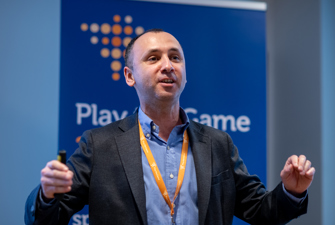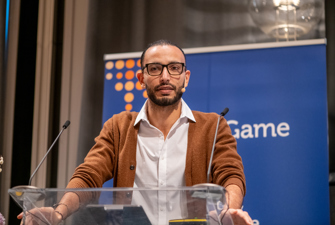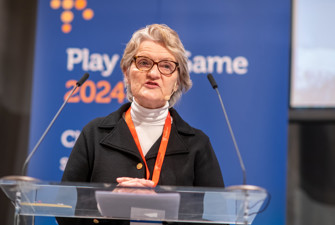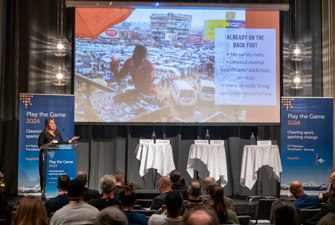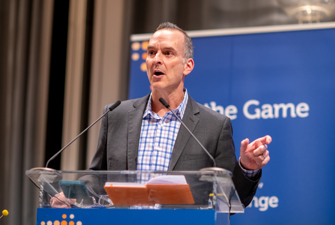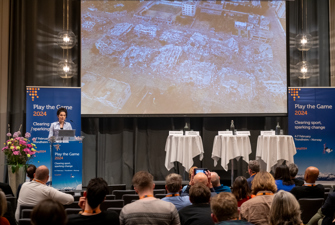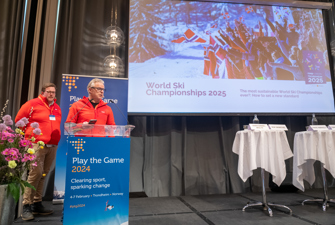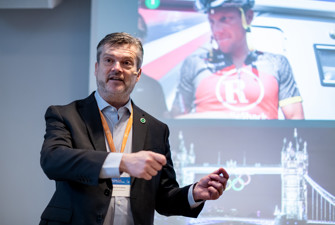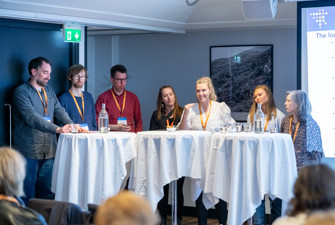Sports organisations are bad at handling sexual abuse, and athletes risk retaliation for speaking out
Several sessions at the Play the Game 2024 highlighted one of the biggest current challenges in sports: Players, coaches, doctors, and managers in both poor and rich countries who abuse their positions in sports to sexually exploit children and young athletes.
Sexual abuse of children and young people in sports was a recurring theme in sessions at Play the Game 2024.
The theme left many speakers and audience members in tears over frightening revelations of a horrifying culture of abuse in sports, which is considered by many commentators to be the biggest challenge in international sports policy right now.
"All the fear, the confusion, the triggering, the pain, and the suffering were kept to myself until it was no longer possible to remain silent," said former Brazilian Olympic swimmer Joanna Maranhão during the opening session, where she gave a moving speech about her struggle to live with the trauma of being sexually abused by her swimming coach from the age of nine.
"When the memories from the abuse came back, I was already a professional athlete. Everything I thought I knew about competitive sports was gone. It felt like I was thrown into a dark tunnel where I couldn't see the light. I kept walking, but obviously not at the same pace, I became scared, depressed, anxious, and grumpy," the Brazilian said.
"At the time it felt impossible to keep going. None of the things I've used to do made any sense. When I tried to kill myself during the process, it wasn't my life I was trying to terminate, it was the pain."
Abuse cases in many countries
The former Olympic swimmer shares this pain with hundreds of other victims of players, coaches, doctors, and managers who abuse their status in sports to sexually exploit some of the weakest members of the global sporting family.
Conference participants heard one horrific story of sports-related sexual abuse after another in countries such as Mali, Afghanistan, Haiti, Argentina, the UK, the US, Canada, and France - the host of the 2024 Olympic Games.
The many cases of sexual abuse of children and young people in the sports world have typically taken place over many years and even decades.
Another common feature is that both national and international sports authorities often turn a blind eye to these cases and do little to solve them, sanction the offenders and help the victims.
A culture of secrecy
"There's a culture of secrecy in sport," explains Canadian freelance journalist and Play the Game Award winner Laura Robinson, who has covered sexual abuse cases in Canadian sport for more than 30 years, including a recent high-profile case of a teenage girl who has reported a gang rape by a group of junior players in Canada's national sport of ice hockey.
"Ice hockey players in Canada are required to prove they are male as early as age 11. In Canadian hockey, that equals a violent person. Fighting is part of the sport. The audience wants to see blood. And even very young junior players are treated in many cities as local heroes who are generally raised to believe they are better than other people and can behave however they want," she says.
Laura Robinson also points out that Canadian hockey players grow up in a highly competitive culture, where they learn to hide physical injuries and keep any other secrets that could cost them a spot on the team and ruin their future careers in the sport.
Sports leaders often protect sexual predators
This culture of secrecy can also be ascribed to the fact that many Canadian sports leaders have been accused of protecting sexual predators in many different Canadian sports over the decades. And even though there are female leaders in Canadian sports, they may not recognise the abuse cases, says Laura Robinson.
"Female sports leaders live in a man's world where they are learning to operate in a violent masculine culture. Furthermore, ice hockey is officially considered part of Canadian heritage."
According to the Canadian freelance journalist, hockey's position as a national heritage sport is part of the reason why it's difficult to get the Canadian government to adopt a legal investigation into the extent of abuse cases across sports in Canadian sports, which is predominantly led by white men.
"The only time we've had a major legal inquiry into Canadian sport was after black Canadian sprinter Ben Johnson's doping case at the 1988 Olympics. That to me is proof that there is also an underlying, unconscious racism in Canada."
Athletes speaking out risk retaliation
According to Kim Shore, who is fighting to give Canadian athletes a stronger voice after years of being silenced, the Canadian news media's revelations of many new cases of abuse and assault two years ago made 2022 a defining year for Canadian athlete activism.
At the same time, Kim Shore emphasised at the conference that activist athletes in Canada are at risk of becoming victims of retaliation. Athletes have seen their careers ruined, and they receive threats, intimidating text messages and lawsuits from coaches who have abused them.
Alexandra Gómez Bruinewoud, senior legal counsel at FIFPRO, highlighted the international football federation FIFA's years-long handling of an Argentinian player's complaint about abuse by a coach.
She pointed to several systemic flaws in FIFA’s handling of abuse cases such as "lack of expertise in administration and decision-making bodies, lack of resources, intention, and willingness, as well as lack of gender perspective."
This was also the experience of Khalida Popal, a refugee Afghan footballer, when she helped several female Afghan national team players complain to FIFA that the national football president in Afghanistan was abusing the players and threatening them into silence.
"The FIFA executives who dealt with the players' complaints had no experience interviewing female footballers in countries like Afghanistan, where women do not talk about their bodies and therefore find it difficult to explain what they have experienced in terms of abuse and assault," said Khalida Popal.
Sports organisations should adopt clear and effective remedies
Ingrid Beutler, founder of Beutler International Sports Advisory, said that all responsible sports organisations have a duty to develop and implement "clear and effective remedies for all types of non-accidental violence and abuse against those in their care."
She calls on sports organisations to take a "human rights, trauma-informed approach to proceedings and investigations, providing support, empowering individuals, reducing the need for repeat interviews, reducing re-traumatisation, enhancing quality and quantity of evidence for proceedings."
And according to former Brazilian Olympic swimmer Joanna Maranhão, who now works as a network coordinator at the Sport & Rights Alliance, there is also a need for sports organisations to involve victims of sexual abuse in the development of more effective and workable support systems.
